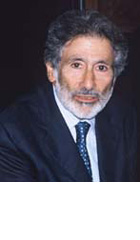
Selves and Others: A Portrait of Edward Said 2003
Distributed by Arab Film Distribution, 10035 35th Ave. NE, Seattle, WA 98125; 206-322-0882
Produced by Salem Brahimi and Wamip Films
Director n/a
VHS, color and b&, 54 min.
Sr. High - Adult
Middle Eastern Studies, International Relations, Political Science, History
Date Entered: 08/31/2004
Reviewed by Beatrice R. Pulliam, MS, Library and Information Science“I contain multitudes”. Edward Said, Columbia University professor and acclaimed intellectual, recited this line from a Walt Whitman poem in the concluding moments of this film, a warm, personal tribute to his life. Said suffered from leukemia for several years and died shortly after filming concluded. Multitudes or multiple identities and histories are a recurring theme reflected upon by Said throughout this collection of interviews and personal moments. As a Palestinian born in Jerusalem and raised in Egypt as a Christian, Professor Said talks about his “second identity” as that of foreigner in Egypt. He recounts his early schooling and animosity existed between Arabs and their English teachers. Said remembers believing that “real history was that of the English”. Though his sense of being in exile would linger throughout his life, Said credits going to America to study at a young age as a good change. He felt that multiple languages and histories were a great source of discovery compared to those who lived their entire lives in the same place.
An early advocate and activist for a separate Palestinian state, Said’s views softened after the Oslo accords in 1993. Said speaks of the need for a bi-national state and saw his role as a Palestinian intellectual as “keeping the word of the Palestinian alive while continuing to provide alternate models and resources of hope.” Said refers to Palestine as the “last remaining Inter-Arab issue” and a challenge not only about land but a challenge to the existing Arab order (including a now outmoded PLO). The film switches gears a bit with stirring footage of Said, a self-proclaimed “frustrated musician” playing Shubert’s Fantasy in F Minor Op. 130 with pianist Diane Walsh. Interviews with Said and conductor Daniel Barenboim follow, highlighting the pair’s collaboration, Parallels and Paradoxes, a print collection of a series of Q&A style workshops developed to bring together Arab and Jewish musicians. Said saw music as a metaphor for political and social bridges and felt the program gave the musicians an opportunity to “think outside the parameters of their individual cultures.” He felt that the “better part of education is to unlearn what you’ve been taught and see it in a larger context”.
The end of the film finds Said seemingly at peace, looking through old photographs, still contemplating the “selves” and the “others”. Said concludes that there is no monolithic identity and possibly more to being “out of place” than in. Said: “If you don’t feel that you belong, you don’t have the experience of owning and dominating. Diminished unity and coherence is better than fundamentalism which is “THIS IS IT” or if you don’t believe you’re the enemy. “
This is an enlightened look into the life and beliefs of an engaging intellectual and should encourage viewers to seek out Said’s many published works.